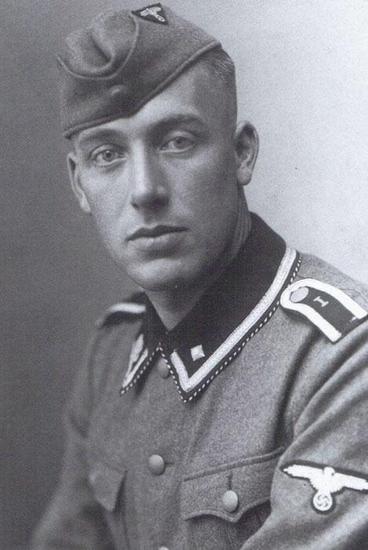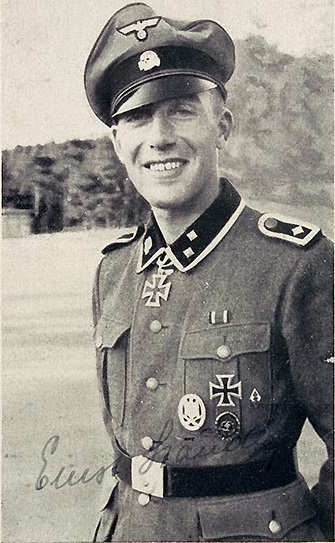awards
|
promotions
|
life and death
Ernst Stäudle was born 6. Juni. 1913, in Heidenheim, Germany. He married Margareta Hugo of Würzburg, although not much else is known about his life before WWII, aside from his service in the Hitlerjugend.
He joined the SS, and was assigned to the SS-Division "Totenkopf", and served with the Artillerie Regiment within the Division.
He was awarded the Knight’s Cross for outstanding deeds during the night battles of 26/27 Feb. 1942. Thanks to their overwhelming numbers, the Soviets came within 50 meters of the German positions in Schumilkino which were manned by just a few defenders. A German construction battalion, which had been sent in as a reinforcement, fled when attacked by the Russian soldier. In those dramatic conditions, despite a severe wound, Stäudle gathered the last survivors of the German garrison and, with only a 3.7cm-Pak 36 available, managed to keep the enemy at bay, at time firing close range. His actions prevented a Soviet breakthrough behind the German positions at Salutschje.
He survived the war, and surrendered. He died on 11 July 1946, in the Central Labour Camp Jaworzno, near Katowice, Poland in Soviet captivity, a victim of Soviet mistreatment, alongside thousands of his comrades.
He joined the SS, and was assigned to the SS-Division "Totenkopf", and served with the Artillerie Regiment within the Division.
He was awarded the Knight’s Cross for outstanding deeds during the night battles of 26/27 Feb. 1942. Thanks to their overwhelming numbers, the Soviets came within 50 meters of the German positions in Schumilkino which were manned by just a few defenders. A German construction battalion, which had been sent in as a reinforcement, fled when attacked by the Russian soldier. In those dramatic conditions, despite a severe wound, Stäudle gathered the last survivors of the German garrison and, with only a 3.7cm-Pak 36 available, managed to keep the enemy at bay, at time firing close range. His actions prevented a Soviet breakthrough behind the German positions at Salutschje.
He survived the war, and surrendered. He died on 11 July 1946, in the Central Labour Camp Jaworzno, near Katowice, Poland in Soviet captivity, a victim of Soviet mistreatment, alongside thousands of his comrades.
DISCLAIMER: 2. Kompanie is a non-political organization We do not support naziism, or fascism. We are not associated with nor do we condone the actions of the Third Reich or the actual 3.SS Division.


